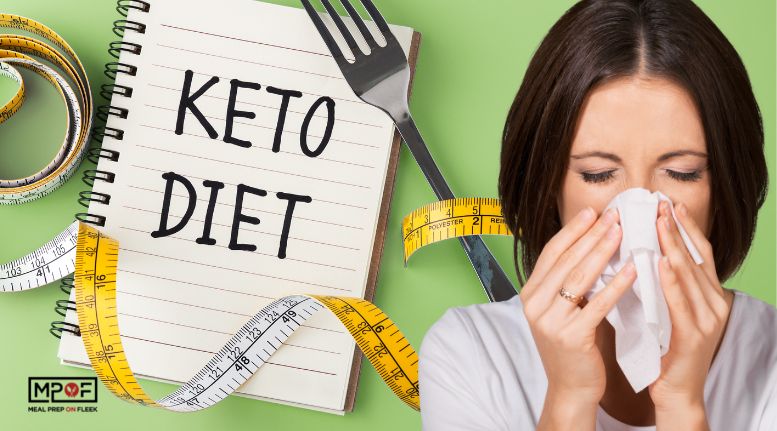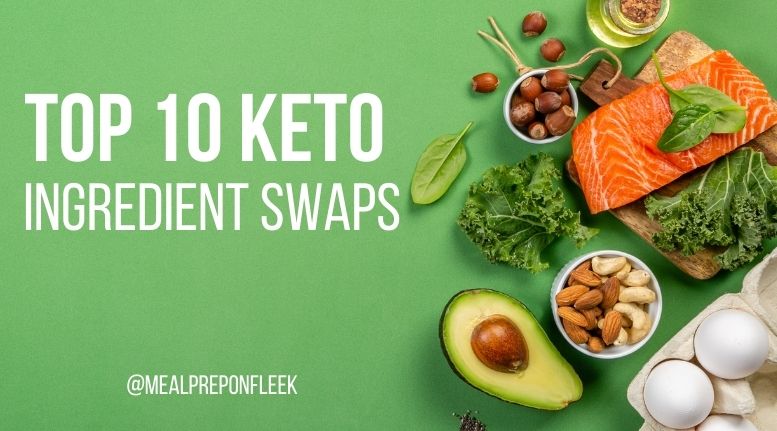There’s no denying that the keto diet is incredibly popular, and many people swear by it as a quick and (relatively) easy way to shed some weight, but the trendy eating regimine isn’t without its fair share of issues. In fact, many of the problems associated with the keto diet stem from the fact that, for many, it represents a big diet change.
While many diets strive to establish a balance between protein, carbohydrates, healthy fats, fiber and more, the keto diet mandates that people eat foods that are high in fat (often including saturated fat, which has been linked to an array of health problems in and of itself) with very few carbohydrates. Keto dieters should also aim to consume a moderate amount of protein in order to go into ketosis, which is the state in which the body burns fat for energy instead of carbohydrates.
Given that macro breakdown, it’s not difficult to see how the keto diet often leads to rapid weight loss. However, though carbs have long been perceived as the enemy of modern diets, there are several carb-heavy foods (such as fresh fruits, vegetables, and whole grains) that provide an array of other health benefits, including adequate fiber content and key vitamins and minerals. By omitting these high-carb foods in the name of keto, you can easily deprive your body of other nutrients that it needs to thrive.
Want to know more about some of the problems associated with the keto diet? Keep reading for more information!

It Can Cause the “Keto Flu”
Perhaps one of the most common side effects of the keto diet is developing a set of symptoms often referred to as the “keto flu.” This condition can include headaches, foggy brain, fatigue, irritability, nausea, difficulty sleeping, and constipation, according to Harvard Medical School. The symptoms typically develop within a week of starting the diet.
Although “keto flu” is not a condition that is recognized by reputable medical journals, it’s certainly well-known within the keto community. Experts aren’t entirely sure why these symptoms occur, as they can vary from person to person, but possible electrolyte imbalances and low blood sugar may play a role. This is because since keto dieters are typically making a big change in what they eat, transitioning to an eating regimen that mandates high fat, moderate amounts of protein and a low intake of carbs
And “Keto Breath”
When your body goes into ketosis, it will start to produce ketones, which are molecules that are produced by the liver from fatty acids. This includes acetone — the same chemical found in nail polish remover. Per a 2015 review of research, your body makes acetone on its own, which is what causes the stinky breath.

It Can Put Stress on Your Kidneys
People often use the keto diet as a quick way to lose weight, but research shows that it can also have a negative impact on your kidney function. More specifically, a high intake of animal foods (which are a key part of the keto diet because they don’t contain carbs) can cause your blood and urine to become more acidic, leading to increased calcium in your urine, which can cause kidney stones.
Additionally, Healthline notes that those with chronic kidney disease should avoid keto. This is because weakened kidneys may be unable to remove the acid buildup in your blood that’s caused by food consumed on the diet. This, in turn, can lead to a state of acidosis, which can accelerate chronic kidney disease.
It May Cause Digestive Issues
Since the keto diet typically requires people to make big changes to their daily meals, it’s no surprise that it can often lead to a host of uncomfortable digestive issues. For some, the keto diet can cause constipation. This is usually related to the significant reduction in the amount of carbs you’re ingesting, as some high-carb keto no-nos, like fruits and whole grains, also contain fiber, which helps you go to the bathroom.
Other keto dieters may experience diarrhea, since the liver needs to release extra bile when you’re following a keto diet. Since bile is a laxative, Prevention notes that diarrhea can be common.
And Changes in Gut Bacteria
Aside from impacting your digestive system, the keto diet can also have a negative effect on the bacteria that lives in your gut, which is important and is often indicative of your overall health. Since a low carb diet such as keto can simultaneously omit or drastically reduce the amount of fiber you eat, which feeds the beneficial bacteria in your gut, not getting enough fiber often means your gut bacteria will suffer.
A 2019 study suggested that low carb diet lacking in fiber, such as keto, may negatively affect your gut bacteria — although more research is needed on this topic before any definitive conclusions are made.
You May Feel Moody
If you’ve ever missed a meal and gotten grumpy (who hasn’t?!) you’re well aware that what you eat (or rather what you don’t eat) can impact your mood.
According to Prevention, since the keto diet is low in carbs you may not be consuming the carbohydrates needed to produce serotonin. This crucial brain chemical helps regulate your mood, sleep and appetite, and without enough of it some pretty epic mood swings could be in store.
It Can Lead to Nutrient Deficiencies
As discussed above, drastically reducing your carbohydrate intake often has the unintended consequence of simultaneously reducing many other nutrients your body needs to thrive. For example, while you may significantly limit the number of blueberries you have with breakfast in order to lower your carb intake, axing the majority of the blueberries you eat also means you’ll be missing out on powerful antioxidants that benefit your hair, nails, and skin. Blueberries are also rich in vitamin k, which helps blood clot properly and can keep your bones strong.
Need more proof? A study that was published in the Journal of the International Society of Sports Nutrition found that very low carb eating patterns like Atkins, which is much like keto, provided sufficient amounts for only 12 of the 27 vitamins and minerals your body needs to obtain from food.
You Might Be at an Increased Risk for Heart Disease
Generally speaking, eating a low-carb diet is healthy in that it lowers one’s risk of developing type 2 diabetes and improves “good” cholesterol, which is helpful for your heart.
Additionally, research suggests that low-carb diets based mostly on plant sources of fat and protein (like avocado, tofu and nuts) can lower one’s heart disease risk by about 30 percent. However, the same was not true for people who ate mostly animal-based proteins and fats, such as bacon, butter, and steak, which are keto-friendly.
What’s more? The American Heart Association says that eating too much saturated fat, which isn’t difficult to do while on keto, can increase your chances of developing heart problems.
It Can Cause Dangerous Blood Sugar Dips
Some research suggests that the keto diet can help decrease levels of hemoglobin A1c, which is a measure of average blood sugar levels. This can be especially problematic and dangerous for type 1 diabetics, as those who have the disease may be at a high risk of more hypoglycemic episodes.
These episodes often include shakiness, fatigue, confusion and sweating, and can lead to coma and death if left untreated.
Additionally, a 2018 study of 11 adults with type 1 diabetes who followed keto for more than two years found that the median number of low blood sugar events was nearly one each day.
It May Damage Your Bones
The keto diet may help you slim down, but multiple studies suggest it’s not great for your bones and overall bone health.
For example, a 2017 study that followed 29 children with epilepsy and on keto over a six month period found that 68 percent of participants had a lower bone mineral density score after they stuck to the eating regimine.
Similarly, a 2020 study of 30 elite walkers concluded that those who were on a keto diet for just shy of one month displayed significantly higher levels of blood markers for bone breakdown when compared to those who followed a diet that included more carbohydrates.
One reason for the diminishing bone health might be that, as discussed, the keto diet is so restrictive that you might not be getting enough fiber, calcium and other nutrients that keep bones healthy and strong.
It Might Alter Your Eating Habits
Prevention notes that axing or drastically reducing the amount of carbs you eat can cause the brain to release a chemical called neuropeptide-Y. This amino acid is responsible for telling the body it needs carbs. When those needs aren’t met, neuropeptide-Y can build up and intensify cravings, regardless of whether or not you’re actually hungry.



Leave a Reply